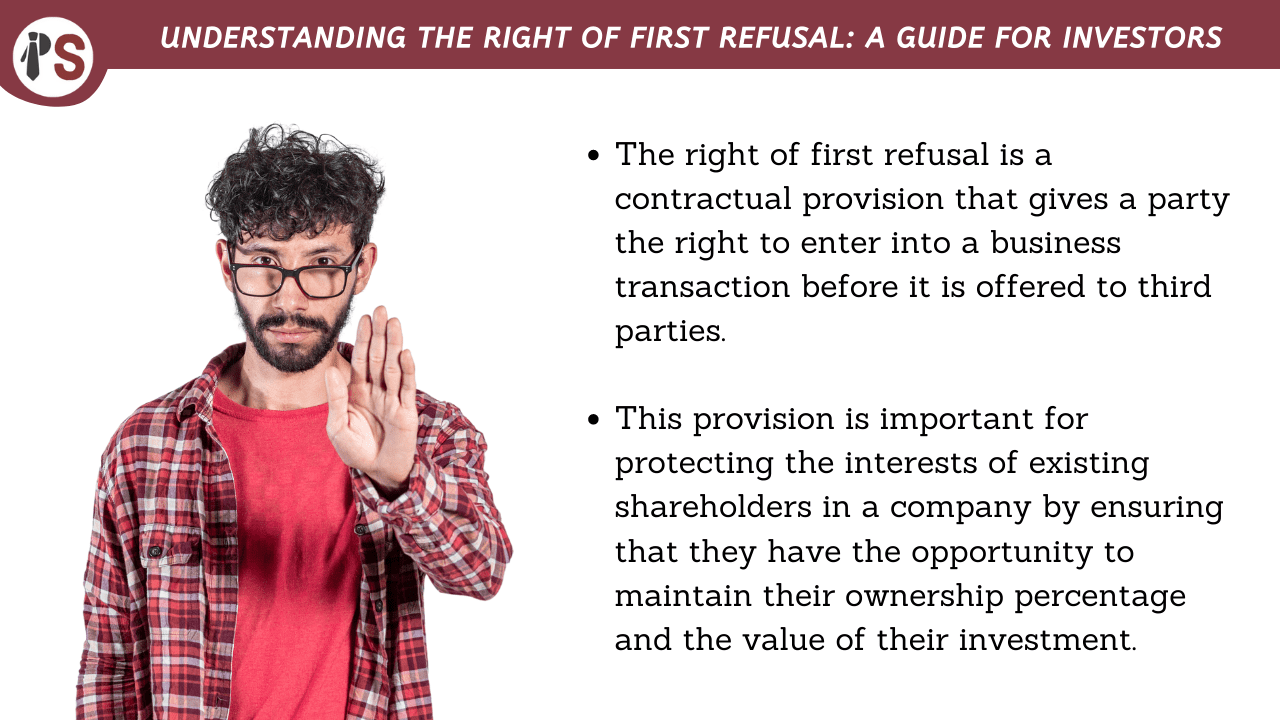
The right of first refusal is a contractual provision that gives a party the right to enter into a business transaction before it is offered to third parties. This provision is commonly used in investment agreements to protect investors and ensure that they have the opportunity to maintain their ownership percentage in a company.
The right of first refusal is a contractual provision that gives a party the right to purchase or participate in a business transaction before it is offered to third parties. In the context of investment agreements, the right of first refusal gives investors the opportunity to purchase additional shares of stock in a company before those shares are offered to other investors or the public.
When a company wants to issue new shares of stock or engage in a merger or acquisition, it must first offer those shares or assets to the existing shareholders with the right of first refusal. The existing shareholders have the option to purchase the shares or assets at a specified price or decline the offer.
If the existing shareholders decline the offer, the company can then offer the shares or assets to third parties. However, the company must still offer the shares or assets to the existing shareholders before closing the transaction with third parties.
The right of first refusal is important for protecting the interests of existing shareholders in a company. This provision ensures that existing shareholders have the opportunity to maintain their ownership percentage and the value of their investment in a company, even when new shares are issued or assets are sold.
Without the right of first refusal, existing shareholders risk dilution of their ownership percentage, which can have a negative impact on the value of their investment. Additionally, without the right of first refusal, existing shareholders may miss out on potential investment opportunities in the company.
There are two types of right of first refusal: the right to offer and the right to match.
With the right to offer, the existing shareholders have the right to make an offer to purchase the shares or assets before they are offered to third parties. The company can either accept the offer or decline it and offer the shares or assets to third parties.
With the right to match, the existing shareholders have the right to match the terms of an offer made by a third party. If the existing shareholders match the offer, they can purchase the shares or assets. If they do not match the offer, the shares or assets can be sold to the third party.
The right of first refusal is an important provision in investment agreements that protects the interests of existing shareholders in a company. This provision ensures that existing shareholders have the opportunity to maintain their ownership percentage and the value of their investment in a company, even when new shares are issued or assets are sold. Investors should carefully consider the right of first refusal included in their investment contract and negotiate the most favorable terms possible to protect their investment.
At Professional Saathi, we offer a range of business consultancy services that help businesses improve their performance, achieve growth, and overcome challenges.
Copyright 2026 © Created By KTPG PROFESSIONAL SAATHI CORPORATE CONSULTANT PRIVATE LIMITED, All Rights Reserved.
Leave Your Comment